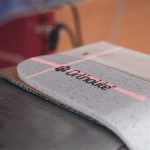The House of Representatives voted 378 to 43 to approve the U.S. Manufacturing Enhancement Act, a measure previously known as the Miscellaneous Tariff Bill and passed every few years. The bill appeared headed for defeat after Republican leaders came out against it, saying that tariff relief for specific industries violated the GOP's self-imposed moratorium on special interest earmarks.
As reported last week by SGMA, the legislation contained an extension of the duty relief for volleyballs, rubber basketballs, leather basketballs, synthetic basketballs, and golf bags that expired on January 1, 2010.
The new language would reduce the duty on volleyballs from 4.8% to free; the duty on rubber basketballs would drop from 4.8% to 0.7%; the duty on leather basketballs would fall from 4.8% to free; the duty on synthetic basketballs would be lowered from 4.8% to 1.1%; and the duty on golf bags would be cut from 7% to 1.5%. There was duty relief on these products from 2007 through 2009. The new duty reduction would run through 2012.
For its part, Outdoor Industry Association said the MTB contained several outdoor products, including extensions of several duty suspensions on waterproof breathable footwear that OIA guided to Congressional passage in 2006, ski and snowboard equipment and footwear and bicycle parts and accessories.
“OIA and our member companies are extremely pleased by today's vote in the House,” said Frank Hugelmeyer, president and CEO of Outdoor Industry Association. “The MTB has several provisions extending duty suspensions on footwear and other outdoor products that over the last three years have saved outdoor companies more than $21 million. Those savings have allowed companies to reinvest in their businesses, invest in innovation, expand employment opportunities and lower retail costs for their customers. In addition, the duty suspensions have actually increased exports of U.S made components for these outdoor products. This is a win for both American businesses and the outdoor consumer.”
The National Association of Manufacturers said the bill, if enacted,
would increase U.S. production by $4.6 billion and support almost 90,000
jobs.
“Manufacturers of all sizes use these vital tariff suspensions to obtain
raw materials, proprietary inputs and other products that are not
available in our nation,” the group's president John Engler said in a
statement.
“Without them, the costs of these companies' products will inevitably
increase, forcing them to pass on these costs to consumers. This hinders
competitiveness and translates into lost jobs,” he said.
Republicans voted 129 to 42 in favor of the bill, even though their
leaders said it violated the party's self-imposed moratorium on
congressional “earmarks” that many blame for what they call wasteful
spending and the record U.S. debt.
The Congressional Budget Office has estimated lost revenue from the
tariff suspensions at $297.8 million through 2012. That is paid for
through custom user fees.
The Senate also must approve the bill before it can go to President
Barack Obama for his signature.
According to a statement from the SGMA, the preferred strategy in the Senate is to approve the legislation using 'Unanimous Consent,' in order to avoid a recorded vote. Under 'Unanimous Consent,' a single U.S. Senator can kill the MTB bill with a 'no' vote.
At present, there is no schedule for consideration of the MTB, but it could be taken up at any time. The U.S. House of Representatives and U.S. Senate are scheduled to leave Washington, D.C. at the beginning of August and return after Labor Day.
“The support of the Miscellaneous Tariff Bill in the House was long overdue and greatly appreciated,” said Bill Sells, SGMA's vice president of government relations. “It's now time for us to focus on getting this bill approved by the U.S. Senate and signed by President Obama.”
The bill would also allow companies to request retroactive relief from January 1, 2010. Companies requesting relief would be required to provide Customs and Border Patrol certain information to be granted retroactive relief.















